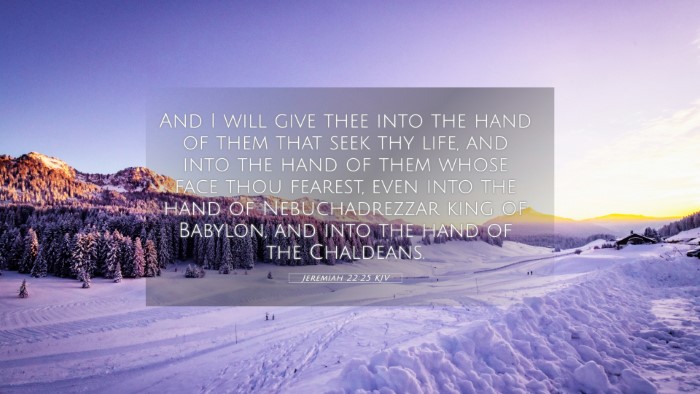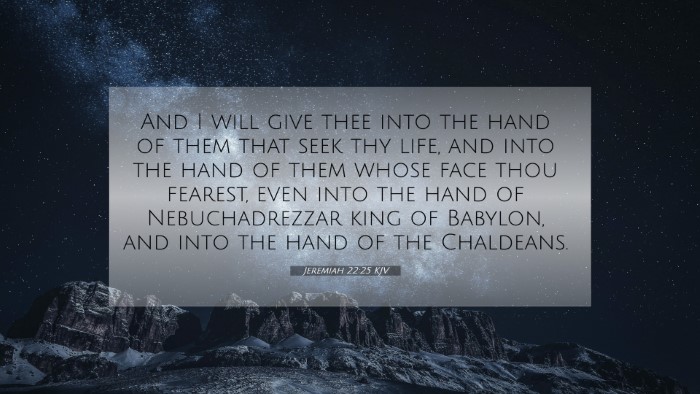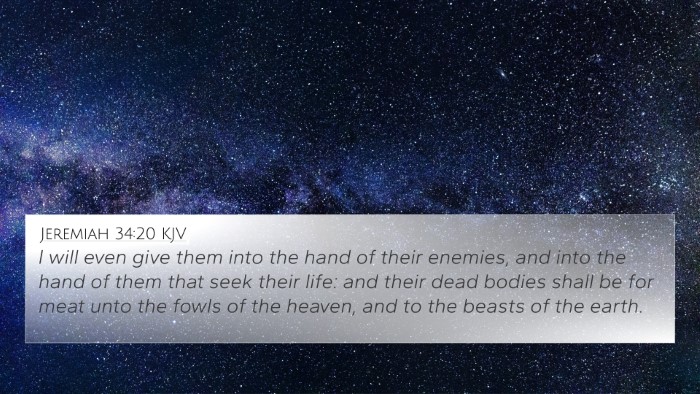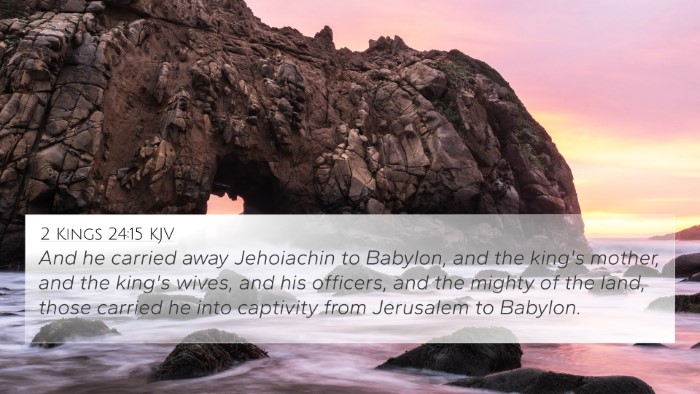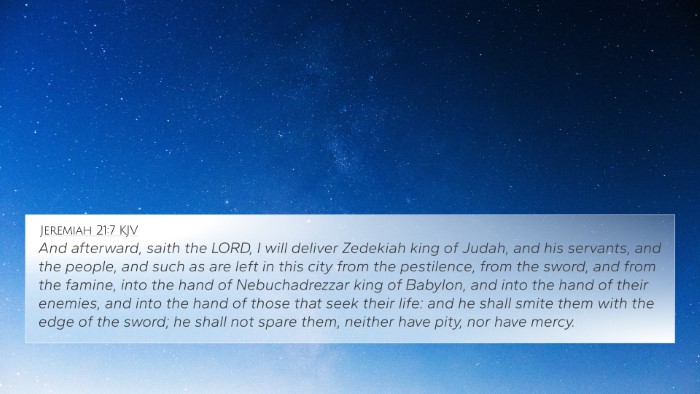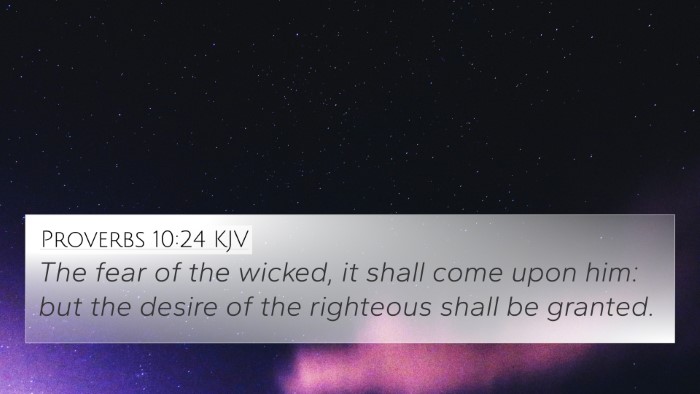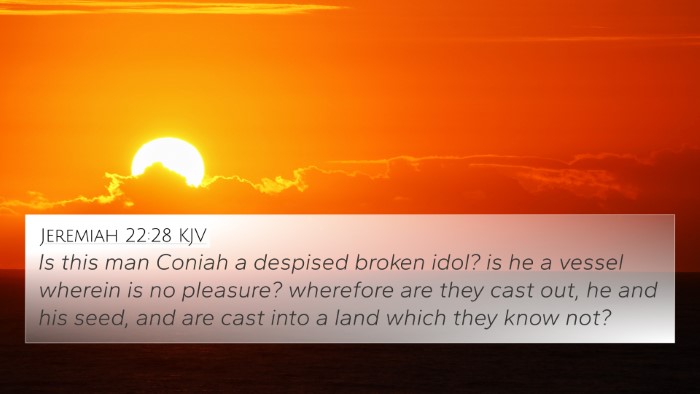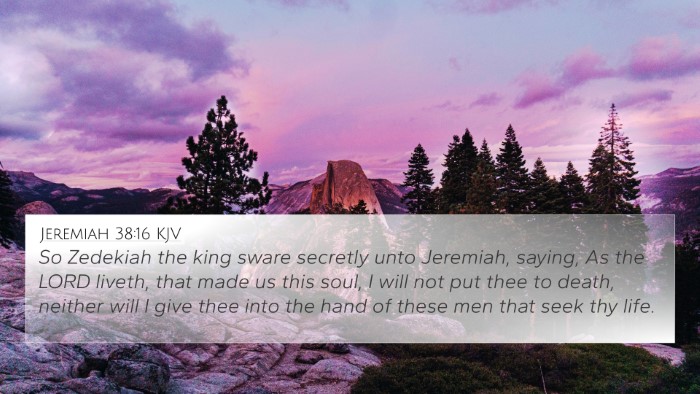Understanding Jeremiah 22:25
Verse: Jeremiah 22:25 states, "And I will give thee into the hand of them that seek thy life, and into the hand of them whose face thou fearest, even into the hand of Nebuchadnezzar king of Babylon, and into the hand of the Chaldeans." This verse reflects God’s judgment upon King Jehoiakim of Judah, symbolizing a divine response to persistent rebellion.
Contextual Background
This verse is situated within the broader narrative of the book of Jeremiah, where the prophet serves as a divine messenger to warn Judah about the impending punishment for their sins, particularly idolatry and social injustices. Jehoiakim's reign is marked by disobedience to God’s commands, and this passage serves as a pivotal moment in prophesying the overthrow of Jerusalem.
Commentary Insights
-
Matthew Henry:
Henry emphasizes the inevitability of God’s judgment and the consequences of rejecting His word. He notes that Jehoiakim's fate underscores the truth that when leaders turn away from God, they will also lead their nations into calamity.
-
Albert Barnes:
Barnes points out that this verse illustrates God’s sovereignty over nations and rulers. The mention of Nebuchadnezzar highlights God’s use of Babylon as an instrument of judgment against His people, demonstrating how He can raise up and cast down leaders according to His will.
-
Adam Clarke:
Clarke discusses the significance of the prophetic warning delivered through Jeremiah. He explains that it serves as a call to repentance, which was disregarded by Jehoiakim, leading to his ultimate downfall. Clarke highlights the importance of heeding divine warnings to avoid disastrous outcomes.
Cross-References
This verse has connections with several other scriptures that illustrate themes of judgment, God’s sovereignty, and the consequences of disobedience:
- 2 Kings 24:2-4: Discusses how God sent Babylon against Judah because of the sins committed.
- Jeremiah 25:8-9: Explains God’s decision to send Nebuchadnezzar against the nations for their idolatry.
- Ezekiel 21:25-27: Mentions the downfall of the wicked and the establishment of a new order.
- Habakkuk 1:6: Highlights God raising up the Chaldeans as a means of judgment.
- Isaiah 10:5: Describes Assyria being used as an instrument of God’s wrath.
- Luke 19:43-44: A New Testament cross-reference where Jesus predicts Jerusalem's destruction.
- Romans 13:1-2: Discusses the divine appointment of rulers and the necessity of submitting to them.
- Proverbs 21:1: States that the king's heart is in the Lord's hand; He directs it like streams of water.
- Matthew 24:2: Jesus prophesies the destruction of the temple, reflecting on judgment themes.
- Revelation 18:2: Describes the fall of Babylon, symbolizing God's final judgment on the wicked.
Thematic Connections
This verse links to broader biblical themes, including:
- Judgment: God's responses to sin are a recurrent theme throughout scripture.
- Sovereignty: It underscores God's control over nations and leaders.
- Repentance: A call to turn back to God, evident in the warnings given through prophets.
- Hope of Restoration: Despite judgment, there remains a promise of eventual restoration for the faithful.
Application for Today
Jeremiah 22:25 serves as a reminder of the seriousness of sin and the importance of listening to God’s warnings. For contemporary readers, this reflects the need for self-examination and revisiting one's relationship with God. It challenges leaders and individuals alike to consider the implications of their actions on themselves and their communities.
Conclusion
Understanding Jeremiah 22:25 within its historical and thematic frameworks allows for a deeper comprehension of its significance in scripture. Through cross-referencing this verse with others, we enhance our study of the Bible, cultivating a better grasp of divine justice, mercy, and the intricate relationships between various biblical texts.

